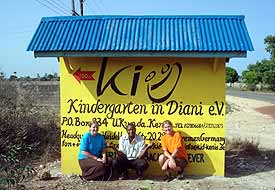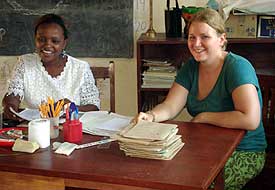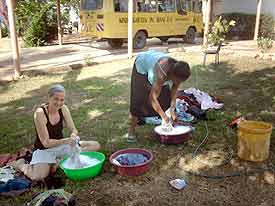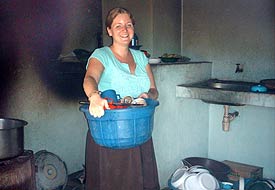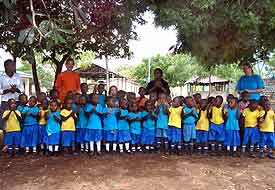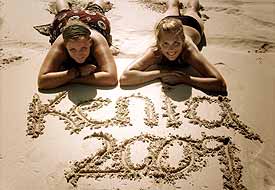Report

- Kenia, 22. February - 8. April 2009
"Seven weeks in a different world"- Travel report by Stefanie Beuernfeind and Merit Sauter
Stefanie wanted to expand her horizons - to experience and see something new, to escape her daily routine in Germany - by working somewhere different. She happened to hear of Kindergarten in Diani and met with some members of the committee. She became so excited about what she learned that it took at least one hour for her to report it all to me - and after that I was just as excited as she was!
So, I, too, went to meet with the committee in Bremen and I was "sold," too!
The days before our departure were crammed with end-of-year exams. But suddenly, it seemed, it was 22 February, and we were actually sitting on the plane to Mombasa; we could hardly believe that we were really on our way to Africa! We had visited Africa as tourists when we were young, but this would be our first real immersion into the culture; we wondered a lot about how it would be – the country, the people, their culture. Now, looking back, it’s clear that nothing we expected could compare with what awaited us there. In fact, the only words we can find to describe it are: “a different world.”
The first difference we noticed, when we finally disembarked, was the heat! But after Tom, a very kind taxi driver, picked us up, we were able to observe many other differences as we drove through Mombasa. Of course, we had imagined that Mombasa would be chaotic, in the way that European cities are chaotic. But Mombasa is not merely chaotic – there appeared to us to be no order at all! Everywhere we saw people, people, people -- so many that it looked as if we had come upon a mass migration! At the same time, at every turn, honking cars drove helter-skelter, only by some miracle avoiding multiple-car collisions. And we saw almost no shops like the ones we are used to in Germany -- merchants simply sold their goods in the streets. In Mombasa, it seemed that all of life happened in the streets! It was unusual for us, from our small German town, to be amongst thousands of people with such deep, dark skin. We felt very conspicuous in our pale skin, and were happy to enjoy the view unobserved, from behind the tinted windows of the taxi.
When we arrived at the kindergarten, we were warmly welcomed by Edward and Joshua, the manager of the kindergarten. It took us just one look into their beaming faces to feel instantly at ease! With our typical German enthusiasm for work, we had arrived in a fresh change of clothes and stood at the door, ready for action. But when Edward and Joshua explained to us that our first order of business was for all of us to sit down, relax and have a cup of “chai” (tea), we immediately felt the spirit of the Kenyan mottos, “hakuna matata” (no problem) and “pole, pole” (slowly, slowly)!
However, our "break" did not last long. After a short introductory discussion with Edward and Joshua, we went to see our classes. Stefanie went to KG2, the classroom for 4-5-year olds, and I to KG1, which was for the 3-4 year olds. There, Teacher Ameeda and Teacher Agnes welcomed us again, while 20 pairs of eyes examined us suspiciously! Both teachers kindly introduced us to the school's teaching methods. It was immediately obvious that the methods worked -- from our first glance, we were totally impressed by what these "little ones" were already learning. It was awesome to watch a two-and-a-half-year-old child read the alphabet forward and backward and then write the numbers 1 – 10 on the blackboard!
Very soon it was time for lunch. "Nyanya“, the cook -- who is known as the ”good soul of the kindergarten“ -- welcomed us and gave us each an enormous serving of ugali, potatoes and cabbage. We knew for sure at this moment that we would not lose weight at KiD! :) After lunch, the two of us went with Joshua to Ukunda, the nearest bigger city (if only just a bit bigger). This meant taking our first ride on a matatu, one of the small Nissan buses which are the most significant means of public transport here. Everything about the ride was quite normal -- by Kenyan standards. Meaning: after the 18th person got on the bus, which had only 14 regular seats, the ticket seller had to hang onto the frame of the open door! This fulfilled our need to experience something new -- and we were delighted to have Joshua with us!
Back at the kindergarten, we got to know all the others. For example, there were Daniel, the bus driver, and John, our “askari” (security guard), who proudly showed us his bow and arrow. Understandably enough, in the evening we were totally beat and quickly disappeared under our mosquito nets.
Over the following weeks, we got completely integrated into the daily life of the kindergarten. The school bus left the kindergarten, empty, at 5 a.m. and returned, full of children, at around 7:45. Those children who walked to school with their parents arrived then, too. Except for two days a week, when hoisting up the Kenyan flag was the order of the day, we usually started the day with exercise. We did stretching exercises and went for walks through the village, or we combined our exercise with something useful: we called it “Collecting Rubbish.” Actually, this meant just clearing the kindergarten grounds of old leaves -- but considering the local temperatures, for the two of us this qualified as an extreme sport. We got used to sweating in Diani, because after sweating for the first time, there was nonstop practice : ). However, it was of no embarrassment at all, because the children as well as the entire team were also in a permanent sweat; it’s simply accepted as a fact of life.
After exercising, the kids went to the toilets to avoid any mishaps during lessons. Then they went into the classrooms. As soon as the teacher entered the classroom, the children became as quiet as a mouse, and for us, it was totally amazing that children at this young age could be so disciplined. Admittedly, the silence ended very quickly, for KiD teachers teach the children to “speak” English by singing English songs! And here, singing is only singing if it is loud enough to make people in the next village hear it, too: the louder, the better! At first, you need to get used to it, but then it is just hilarious to watch the children trying to sing even louder than their neighbour!
During our stay, we taught them the German songs “Bruder Jakob” (“Are You Sleeping, Brother John?”) and “Das rote Pferd” (“The Red Horse”), and of course, it was a special pleasure for us to hear them speaking German!
Maths or English followed (depending on the day) and, as we’ve mentioned, we were deeply impressed by the kids’ high standard of performance. You have to consider that, first, they all start off speaking their own mother tongue; next, they learn Swahili; and then, they begin to learn English in kindergarten. All this, in only their first three years of life.
In the beginning, we mostly looked over the shoulders of the teachers and helped teach small parts of the lessons. But after only the first week, we were “thrown into the deep end”: Teacher Agnes had to attend a meeting, so Joshua gave us full responsibility for one of the classes; we would have to go it alone! Of course, we were somewhat frightened at first, but after a day with much laughter all around – the children laughed, and so did we! – plus being somewhat familiar with the subject matter, we were proud of how well we coped. And, as a bonus, we felt completely accepted at KiD.
But back to the routine of the day. At 10:00, after the first two lessons , we paused for “porridge” (a boiled mixture made out of coarse flour, water and sugar) for the children and “chai” (black tea with milk and a whole lot of sugar) - which was especially MY favourite – for us. At 11:00, the third lesson began. At 12:00 it was time for the children to take a bathroom break and then to go to the nap room for one hour’s sleep. We usually used this time to work on sprucing up the KG2 classroom a bit. We painted lots of posters with English vocabulary words and their corresponding illustrations. At 1 p.m., it was time to wake the kids from their naps, and, even though some of them were still pretty groggy, they began to queue up in front of Nyanya’s kitchen. Some of the little ones polished off unbelievably large portions of whatever Nyanya served, but considering the fact that this is for many of them the only full meal of the day, it is quite understandable. After lunch, at 2 p.m., the fourth lesson started. This might be Art or Environmental Science, as well as time to do homework. But every day ended with singing, singing, singing!
After dismissal, some of the children got on the school bus for home, while others left the kindergarten hand-in-hand with their mothers. Meanwhile, the two of us took a moment to “crash” in the hand-made basket-chairs in front of our room :) . After a short rest, we usually took a little walk to our favourite supermarket, or to the internet café or to the beach. At first we were a bit sceptical about going out by ourselves, but it was never any problem. As time went by, almost everybody in the area began to recognise us, and greet us with a friendly “Jambo!”
On weekends, we took lots of excursions to Mombasa or to the national parks, Shimba Hills and Wasini Marine Park. How proud we were, after our culture shock on the day we arrived, to find ourselves strolling peacefully through Mombasa, not feeling in the least bit out of place. We’d also gotten used to riding on the matatu, and we enjoyed riding around watching the people passing by. We always discovered something new.
In short, it didn’t take long before we were accustomed to the Kenyan way of life; we just absorbed everything we could and tried to go with the flow. As it turned out, everything went perfectly, so we didn’t have any bad experiences.
Neither of us can express how thankful we are for this unique experience! It’s not like anything we’ve ever done before. In just a short period, we gained insights into the way Kenyan people think and live. We’ve seen what’s great, and what’s difficult, about being Kenyan. We will surely carry this understanding with us for the rest of our lives. Of course, we now have a better awareness of just how good life is for us here in Germany -- we want for nothing. And even though we Germans know that the world is full of people who have to get along with almost nothing (in the material sense), it was another matter for us to see that situation with our own eyes. It was also good to see that we Europeans don’t have to simply accept this, but that we can help! We now have a deeper respect for why KiD was founded and for all the hard work it takes to keep it running. We feel very proud and very lucky that we could be part of it!
The whole Kindergarten in Diani team was so kind and welcoming toward us, we just want to say: THANK YOU, again and again, for this chance!
We will never, ever forget Kenya and Kindergarten in Diani!
Stefanie und Merit
